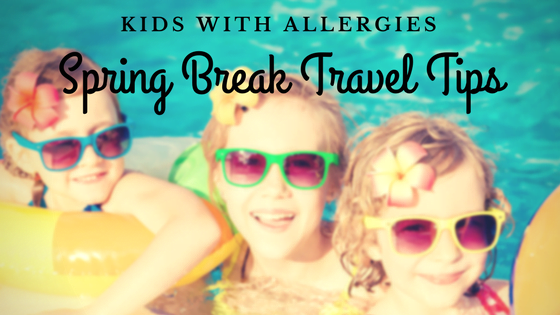Spring Break Travel Tips for Kids with Allergies

Across the country, families are counting down to spring break to enjoy some much-needed rest and relaxation while the kids are out of school. Yet, springtime can also be the worst time of the year for allergies.
Before you head out on your spring break adventures, keep these travel tips in mind so both you and your kids can enjoy a fun and relaxing spring break.
Choose a Proper Destination
Your vacation destination can be key. Certain locations may make your or your child’s allergies even worse. Locations with lush vegetation and pollen-producing plants are more likely to keep you sniffling and sneezing all week long. Popular allergy friendly locations include the desert, beaches, snowy locations, and cruises.
Schedule an Appointment with an Allergist Before You Go
Allergies can come at any age. An allergist can tell you exactly what allergens you or your child is allergic to through allergy testing. These tests are typically conducted as skin tests or blood tests. Skin tests are most common and involve testing an area on the back or forearm. If your child allergic to an allergen, they may briefly experience a small hive at the test spot.
Blood tests are also helpful and may be used as a confirmatory test or when certain medical conditions prevent allergy skin testing. Once you receive a diagnosis, your allergist can recommend the most optimal treatment plan to reduce symptoms.
Start Allergy Medications Before Symptoms Start
The key to making it through allergy season unscathed is by starting allergy medications before the symptoms start. Medications can be useful after symptoms are present, but it takes longer to feel relief. Speak with your allergist to get your kids started on allergy medications before spring break starts.
Keep Windows and Doors Shut
If you’re headed to a location with higher levels of pollen and other outdoor allergens, reduce exposure by keeping the windows and doors shut in the home and in your car. Use air conditioning for fresh, filtered air and make sure the air filters are clean and working properly.
Avoid Peak Times of Day
Download an allergy app or check the pollen count in the area you’re traveling to each day. Some days may be worse than others and you may need to keep the kids inside during peak hours. Pollen counts peak in the afternoon and is lowest in the morning and late afternoon or evening.
Travel Prepared for Anaphylaxis
While most allergies aren’t severe, there’s the potential for a life-threatening reaction to foods or certain stinging insects. Go on vacation prepared by carrying an epinephrine pen if there is a history of severe allergies to foods or insects (such as bees, wasps, hornets or fire ants). Always have the epinephrine pen available in the event your you or your child is exposed to a serious allergen and experiences anaphylaxis.
Get your family ready for a fun and relaxing spring break by thinking about allergy prevention before you go. If you think you or your child needs allergy testing, contact the Allergy & Asthma Specialists of North Florida for testing and treatment options.
